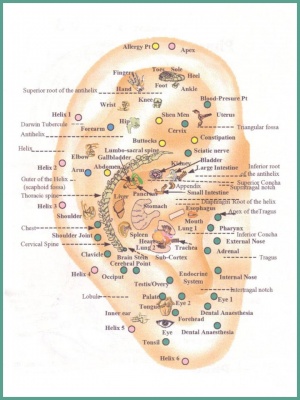Auriculotherapy
Other Names : auricular therapy, Ear acupuncture
Auriculotherapy was developed by Dr. Paul Nogier, a neurologist, in the 1950's. He became interested in the study when several of his sciatic patients related how they had been helped by a middle eastern woman. They reported that their suffering ended after she put a hot needle into their ears. Nogier began his quest to understand more of this system.
Since then, researchers such as Terry Oleson, PhD from UCLA, and Dr. Jay Holder in Miami, FL have expanded Nogier's work. Oleson, using radioisotope techniques, showed how these ear points could be located and identified their relationship to areas of the body. The acupuncture meridians do not innervate the ear. Originally, Chinese medicine evolved to include a form of auriculotherapy that used needles placed in the ear to treat opiate addictions as well as other problems, Nogier became aware, however, that auricular points differ from acupuncture points: Auricular points can move; acupuncture points are stationary. To detect the movable points, Nogier used elaborate cameras with filters but it was time consuming. Today, a noninvasive microstimulation device is used to not only detect the points but to deliver a microcurrent that effectively treats the points faster and more accurately than would be possible with a needle. The microcurrent feels like a slight prick with a needle. Although some mild discomfort is possible, most patients find it just barely noticeable and tolerable.
Special Precautions of Auriculotherapy
The benefits of Auriculotherapy are
This self-treatment triggers the brain to release powerful bio-chemicals to eliminate pain and restore balance in the body! It's the body's own "prescription" to heal itself. Used for :
- pain
- high blood pressure
- excess weight
- addictions: smoking, food, gambling, sex, alcohol
- Compulsive Disorders
- diabetes
- insomnia
- Internal Disorders
